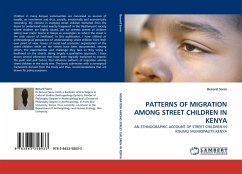As kinship relationships and support networks across family lines weaken with modernization, economic stressors take a great toll on children. Kenya, like some other nations in Africa and around the globe, has witnessed a rapid rise in street children. The street children in Nairobi come from single parent families which are mostly headed by women. Another group are AIDS orphans. This study documents how street children in Nairobi follow survival strategies including (for boys) collecting garbage, and (for girls), prostitution. Gender is emphasized throughout the book. Although impoverished families are the most likely to produce street children, not all poor families have their children on the streets. The problem of street children is a complex one that calls for a comprehensive and coordinated policy and program for intervention at all levels and in all sectors of society. Alleviating poverty and rebuilding the family institution should be among the first steps in addressing the problem.
Hinweis: Dieser Artikel kann nur an eine deutsche Lieferadresse ausgeliefert werden.
Hinweis: Dieser Artikel kann nur an eine deutsche Lieferadresse ausgeliefert werden.








